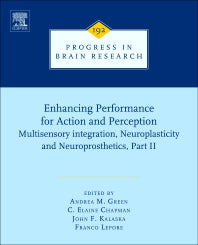Freshly Printed - allow 10 days lead
Couldn't load pickup availability
Enhancing Performance for Action and Perception
Multisensory integration, Neuroplasticity and Neuroprosthetics, Part II
Provides an overview of the various neural mechanisms that contribute to learning new motor and sensory skills and to adapting to changed circumstances, including the use of devices and implants to substitute for lost sensory or motor abilities (brain machine Interfaces)
Franco Lepore (Volume editor), Andrea Green (Volume editor), C. Elaine Chapman (Volume editor), John F Kalaska (Volume editor)
9780444533555, Elsevier Science
Hardback, published 28 July 2011
328 pages
23.4 x 19 x 2.4 cm, 0.83 kg
"This is a great resource for those looking for a collection of studies on neural plasticity and neural mechanisms covered at the annual symposium. It clearly highlights some of the innovations made in the field and does so in a concise and organized manner." --Doody.com, October 2013
This volume of Progess in Brain Research follows on from the 32nd International Symposium of the Groupe de recherche sur le système nerveux central (GRSNC), May 2010, and aims to provide an overview of the various neural mechanisms that contribute to learning new motor and sensory skills, and to adapting to changed circumstances, including the use of devices and implants to substitute for lost sensory or motor abilities (brain machine interfaces). The focus is on recent developments covering five major themes: This volume focuses on the translation of scientific knowledge into applications and strategies that can help restore lost function following injury or disease including assistive neuroprosthetic technologies to enhance sensorimotor performance and neurorehabilitation.
SECTION I: Assistive Technologies To Enhance Sensorimotor Performance SECTION II: Neurorehabilitation
Subject Areas: Neurosciences [PSAN], Neurology & clinical neurophysiology [MJN], Cognition & cognitive psychology [JMR], Physiological & neuro-psychology, biopsychology [JMM]


